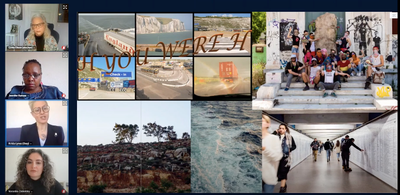Online-Event „En-Gendering Borders: Media and Migration Reframed” April 29th 2022
Online-Event „En-Gendering Borders: Media and Migration Reframed” April 29th 2022
The Online-Event “En-Gendering Borders: Media an Migration Reframed”, which was part of the Lecture Series “Transnational and International Critiques of Power”, took place on April 29th. Guest Speakers were Prof. Krista Lynes (Canada Research Chair in Feminist Media Studies and Associate Professor in Communication Studies at Concordia University, Montréal), Jennifer Kaumau (International Women*Space Berlin) and Prof. Greta Olson (JLU Giessen). The event was moderated by Dr. Veronika Zablotsky (Freie Universität Berlin). It was hosted by the ZMI’s Research Group on “Media and Gender”, the Giessen Graduate Center for Social Science, Business, Economics and Law (GGS) and the chair of Gender Studies at the Institute of Political Science at JLU.

Krista Lynes started by pointing out that they would not use the word crisis as a periodizing term, but as a term relating to political operations, which as a response can have real effects that are lived as crises. The book “Moving Images: Mediating Migration as Crisis” is the first project of theirs Lynes spoke on. The central idea of this publication is an intersectional anti-racist feminist critique of the so-called Migrant crisis in Europe. Initially, the term is critiqued, which then leads to a closer look at the emergence of said crisis related to longstanding politics of imperial violence and racial capitalism.
The second project Lynes recounted is called “Doing Feminism in the Pandemic”, which was a community project centered around the already existing but, with the arrival of Covid, increasing inequalities, which made vulnerable members of the community even more vulnerable.
Jennifer Kamau brought a distinguished activist perspective into the discussion. She first mentioned that the cause of the IWS’ activism was a direct reaction to the discrimination Migrant Women* were facing in Germany. Kamau, just as Lynes did, pointed out that crises can serve as an incentive to implement dehumanizing laws against Refugees. She argued that the media portrayal of Migrants played a huge role in this by declaring these very people either victims or criminals – without taking into account that the German asylum system deprived them of their basic human needs and forced them into a position of vulnerability.

Greta Olson’s presentation was concerned with the framing of the so-called Migrant crisis in prominent media discourses. Referencing images from the 2015/2016-period, she pointed out that male Refugees or Refugees gendered as masculine were treated as non-humans in two different ways: they were either depicted as a natural disaster or as criminals, especially as sexual predators.
Olson then pointed out that the other kind of most prominent image from the crisis were the Humanitarian Images. Those images, she argued, were regretfully most of all concerned with the feelings they evoked in the viewer, letting them decide if they wanted to take on the role of the white savior. Concluding her statement, she argued that a mixture of gender and race in prominent media discourses regarding Migrant movements is being weaponized in racist and sexist ways.
For further information, there is a detailed account of “En-Gendering Borders: Media and Migration Reframed” and a recording of the event.
(Carina Müller, June 2022)
